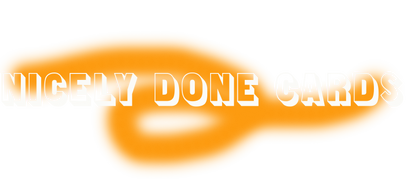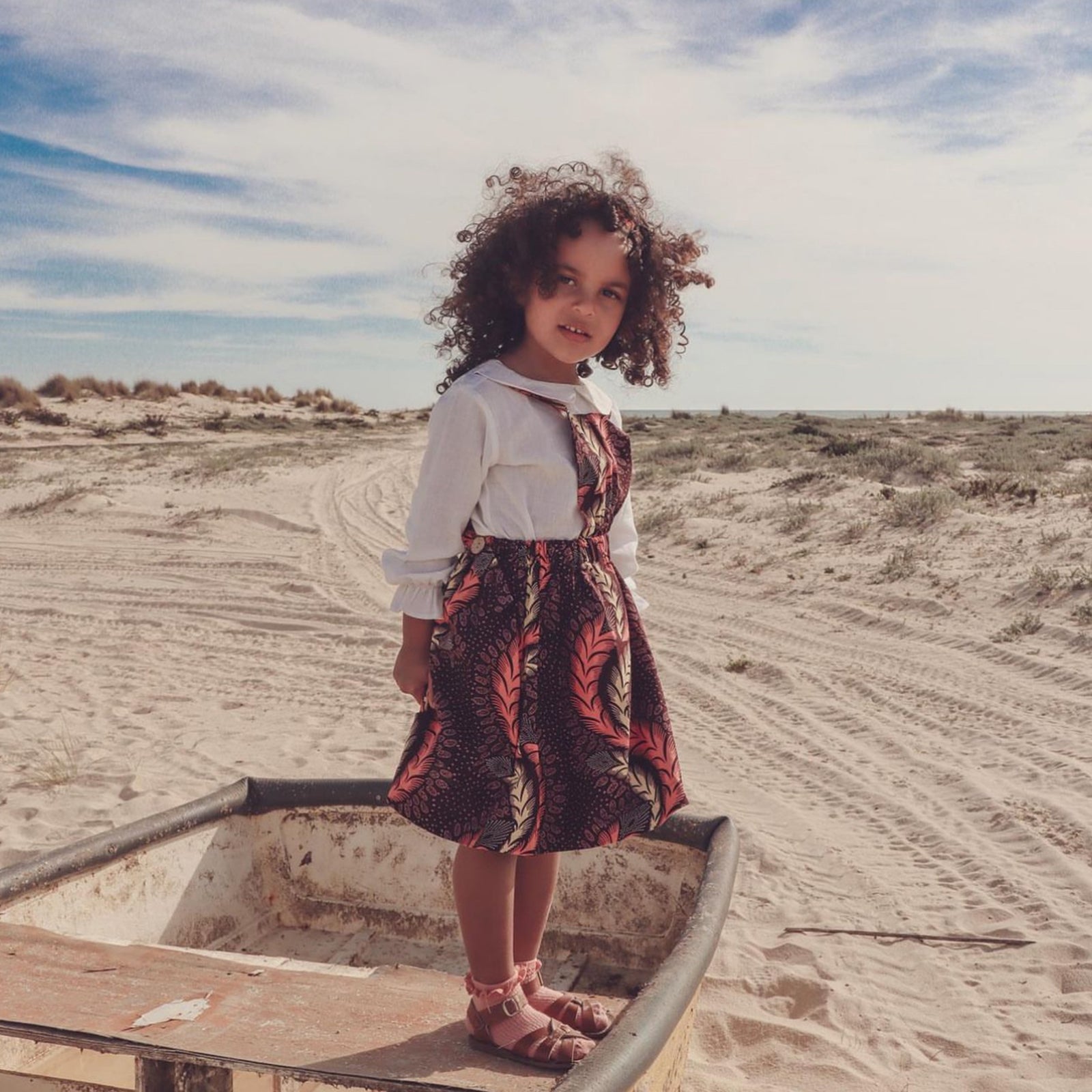‘I’m going to be in the car because Asher has a play date in Luton and then another in central London, so it’s the perfect time to talk to you’ Seyi messages me happily one Saturday morning as we try to find a time to talk. I feel Seyi is no stranger to multi-tasking, the founder of childrenswear brand Kamso. As a single mother running a fast-growing fashion brand, I was keen to learn more about her journey to where she is today.
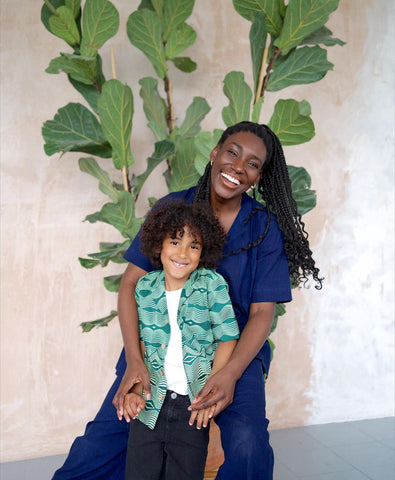
Seyi, Founder of Kamso and her son, Asher
Take us back to the beginning. Seyi, who would we meet as a child?
Taking it all the way back to the beginning, I was an outgoing child, to some extent. I have an older sister who is much more outgoing, so in her presence, I’m probably seen as the quieter one. But by myself, I was talkative and personable.
I grew up with my sister in Hertfordshire and I was brought up by my mum who was essentially a single parent, as my dad moved to Nigeria when I was 12. She worked extremely hard as a social worker and then later opened her recruitment agency business when she realised working all the hours under the sun was not enough to keep both her daughters in the private school she had enrolled us in. She was a single mum, who had to adapt and evolve, to ensure the survival of her family and I think that very much shaped me. The recruitment agency she started did reasonably well so we were able to live a moderately comfortable life in my pre to early teenage years. I look back on my childhood though and it was a lot of play. We didn’t always have a lot of money but I have very fond memories of that time.
What was school like for you?
I loved school, I really did. I was quite smart but easily distracted and wasn’t organised. There was always this comparison between myself and my sister, Eni. She may not have been as academic as me but she was a hard worker, and teachers would say, ‘Oh Seyi is so much more clever than Eni but she just doesn’t work and doesn’t reach her full potential’. And that kind of followed me through my schooling.
In Junior School, my sister and I were the only Black children for the majority of my time there; however once we reached secondary school there were a few more in the different years. Despite this, I never felt ‘othered’. Our school was very small where some children would literally be dropped off by their drivers, and had Range Rovers and other fancy cars whilst we would pull up in our battered Fiat Punto. I didn’t care as a kid but now looking back as an adult, I really respect my mum for holding her head up high in an environment like that. Our mum wanted us to have all the opportunities, and I think the other mums would see our mum and go, ‘Wow, she’s really trying to make it work.’ and they would be so supportive to us. It was just such a lovely environment. So when I hear of private schools being elitist and racist, I really didn’t have that experience. I think most parents genuinely respected what my mum was trying to achieve, because sending two kids to private school is no joke!
It was in Secondary School that my race may have played a factor in my treatment but even at the time I did not pay cognisance to it. I was a good student, and I was well behaved in that I would do things but [only] up to a line and I wouldn’t cross that line. Unlike other students, however, I feel I was punished as if I had crossed that line. The teachers’ view of me was very different to the reality of who I was. I played netball for County, and I was asked to play Lacrosse for County too. I did Speech and Drama, and was just a very well-rounded kid. Usually that type of student would become Prefect, but that didn’t happen for me. I was predicted C’s, D’s and a U for my GCSE’s. I actually got all A’s and A*’s . I don’t really like to put things down to race, but I genuinely do think race was a factor there.
In Sixth Form I decided to move to a Grammar school, and at that school, usually not one new person would get a Prefect position, but I got one. And I think that doubled down on my belief that the teachers at my old school didn’t see that in me, whereas they did in my new school. I definitely felt vindicated.
As a teenager/young adult, who did you look up to?
I loved Destiny’s Child, and I loved Kelly Rowland. I’ve always loved someone who is not necessarily the Number One, but someone who is still doing their thing. And in the Powerpuff girls, I loved the green Powerpuff, so random I know! But it's always the Number Two that's drawn me.
Within my world, I really looked up to my mum. I don’t tell her enough probably, and I don’t think she knows it, which is a shame. But I just think she is an incredible woman. I think she is someone that when she dies, people are going to come to her funeral in droves. When I was younger, she always made me feel safe, she always made me feel like I can do anything, I’m capable of anything. She gave me tough love, but she really championed me. My sister and my mum are lighter skinned than me. I’ve got quite a dark complexion and I always remember her telling me how beautiful my complexion is, how much she wished she had my complexion, and building that part of me up so that I never ever wanted to be anything but myself. She taught me about hard work, she taught me about how nothing is handed to you but she also spoilt me in different ways. And then there are my aunts and uncles and cousins. I’m one of those people, even on Instagram, on my personal account, I don’t really follow too many random people and that’s synonymous with my life. I’ve never looked to anybody I didn’t know and thought, ‘Oh I really admire you,’ because it’s really hard to admire someone you don’t know. It’s very easy to admire someone when you can see all elements of who they are. So in terms of people I wanted to emulate, I only looked around me because I have been surrounded by really great women. My aunties, my mum - and then my sister. She was probably the first person I looked up to and wanted to be like but when she left for university I became my own person and realised just how different we are. When we were growing up we were essentially the same because I just copied her.
I also had a great English teacher who saw me for who I was and opened up the world of books and novels. I love reading and looking at different viewpoints and I think that’s the gift she gave me; to see where other people are coming from. It’s such a good skill to have and because she had it, she was able to see me in the light that others may not have. And today one of my biggest pet peeves is not being understood and people not being able to see things from my perspective. If you have your own perspective, that’s fine and I respect that, but at least have the ability to view what I’m saying and why I am saying it. I think that teacher was one of the first people that subtly and quietly was able to see me thoroughly. And I think a lot of the time teenagers don’t feel seen.
After school, the next 5-10 (or more) years differ so much for people. And tends to be a real time of growth whether we want it to be or not! What did they look like for you?
So I left school when I was 18 and had my son when I was 22! I went to Newcastle University to study food and human nutrition and going from a reasonably sheltered life and doing my A levels where I was quite disciplined and not having too much fun, to starting Uni where you party hard and you work hard, which is very much my ethos, it was an extremely pivotal moment. I loved the freedom of saying, ‘Do you know what? I’m going to have fun.’ Second Year was harder as I was captain of the Lacrosse team and training was three times a week. Plus, I became an ambassador for Adidas, which was fun and you get free clothes but you have to create, plan and run events on campus. And my course was really intense because I did labs and worked 27 hour weeks whereas most Uni courses would be around 9 hours. So I had to learn to time manage - but I was still going out and partying!
My plan was to work for WHO (World Health Organisation) or the UN (United Nations) so I wanted to get experience in clinics, I did a placement year off the coast of Honduras on a tiny, beautiful island called Roatan, I had one of the best years of my life but then I get pregnant literally a couple of weeks before I’m heading home at the end of the placement. With a year of Uni left, I had to rethink my plan. Working for WHO or the UN, where you have to work on the ground is not something you can do with a child. So I went back to Newcastle with my son due in February and that was tough, [although] a lot of people didn’t know I was actually pregnant, I was quite blessed in the sense that Newcastle is quite cold and I could wear big hoodies and jackets to kind of hide it. But at the same time, I knew I had a deadline and the clock was ticking. I had to get my dissertation done early, because I wasn’t sure how I would balance things once my son arrived. So it was quite a stressful time, however I learnt so much about myself. I learnt about my tenacious character. I learnt that I can actually push through and make it. I learnt that there’s consequences to actions - that’s a big one! But I would do everything that I have done again because everything works out the way that it is supposed to work out.
I think as a young person, you have to remember that the consequences to actions are real and you have to keep your end goal at the forefront of your mind, so that you don’t forgo it based on how you’re feeling at the time. My Uni allowed me to take my January exams at their London campus, and I gave birth to my son, Asher, in February. I then had to leave him a week after giving birth to go back to university which was extremely tough. But if I didn’t go back, I wouldn’t be able to graduate that year.
It was so stressful, to the point that despite constantly pumping milk, freezing it and sending it to London, my milk actually dried up which I found extremely disappointing as I had wanted to breastfeed for longer. I was away from him until he was three or four months old and I felt I was missing massive chunks of his life. But I knew I needed to do this! When I told my mum I was pregnant, she said ‘You just need to graduate. If you graduate, I’m happy’. So I did! It was hard. It was horrible. I missed my son. I FaceTimed him every day, I missed the first time he had solid food and I cried in the shower. But I did it.
I think the hardest thing was when I came back home, and I rushed to see him, picked him up, but he didn’t even know who I was and was trying to get away from me. That genuinely, broke my heart! But that lasted a couple days and then he got to know me. This is why, again, I say my mum is an incredible person. Because she was the one that looked after him when I was in university. She had been living in Nigeria but moved back to the UK and she, as well as my sister, looked after Asher for me.
Did you see yourself being a business owner?
Categorically, no. In fact, the opposite. My mum always said, ‘You need to find a way to have a business. That’s where freedom comes from’. And I was saying, ‘Mum, I’m not an entrepreneur, I really don’t know where I would start. I just want a well-paid job’. And now we joke about it. What’s also funny is that the two GCSE’s where I got an A* were Business Studies and Child Development and most people know me either as the owner of Kamso or Asher’s mum.
How did the idea for Kamso come about?
I was working at a start-up business and it gave me the confidence to realise that if they can do it, I can do it too. I had saved a decent amount of money from working there and I decided to set up my own thing. Asher being bi-racial, I wanted him to identify with his African roots in some form. I cared about how he dressed and perceived himself but when I looked at the childrenswear market, there wasn’t actually any African inspired clothing that I would want Asher to wear or really spoke to what Nigerian culture is to me. I also didn’t see anything really championing an ethical partnership and using ethical fabrics. In Nigeria, of course there’s viscose printed fabrics, but there’s also handmade, hand loomed fabrics, and Nigerians make most of their clothing. I worked with a tailor in Nigeria and started with a few samples.
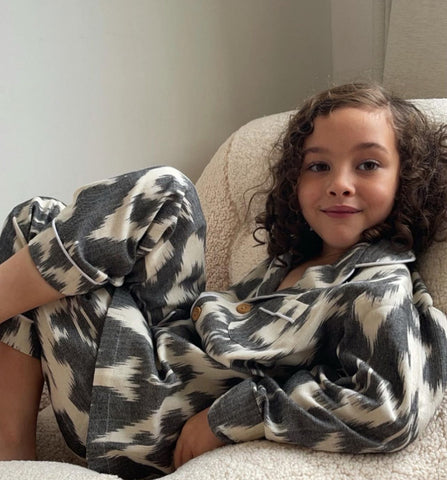
Kamso pyjamas
In the early years of Kamso, how did you find it?
Kamso started May 2019 and the first Covid lockdown was in March 2020, so my year one was very different to if I started it now. In some ways the playing field was very level, no one knew what to expect, so when I launched and I got 6 orders, it felt really cool knowing that people liked it. And then to market it further I would do stalls and it was a way to meet customers. People were able to actually experience in person what Kamso was.
Did you find markets were successful for you?
Whenever I have done a market I have always broken even. But it’s a lot of work, you are constantly talking to people and just constantly ‘on’. Also, the markets I did, I don’t think people passing by knew that the market was happening, so when people were going past the stall, you knew they probably weren’t looking to buy ethical, good quality kids clothing with a relatively high price point, making it even harder to make sales. But they were useful, it got our name out there and it was great to meet people. Now I’m selective on whether I do markets or not, because it's time consuming and if I don’t think I will make enough doing it, I would rather put that time into doing something like social media strategy.
At what point did you feel that Kamso was standing on its own feet?
I didn’t realise Kamso was doing reasonably well for a new business. We launched and had good sales but I thought that was just how it works. By mid 2021 we had three wholesale stockists and at this point we were able to move from using freelance artisans to having our own studio in Nigeria, where we have our own artisans on a salary creating the pieces. It meant we had better control over lead times and quality.
Did you have any failures?
Well, at the point of starting the studio in Nigeria I should have hired help and stopped operating Kamso as a solo business. But I didn’t and had a burn-out because I was spread way too thin. I was managing the studio from afar, ensuring the new season items were going to plan, managing the wholesale side of the business along with the relationships with our stockists plus all the work that goes into our e-commerce side. I should have had someone come in to help with the admin and the social media but I am a micro-manager. I did actually get a social media manager in, and they were good and the posts were similar to what I would post, but the engagement dropped. So when that happened, and I was paying a reasonable amount for it, it fed into my fears and I took on that responsibility again. I do think there’s a massive part of ‘no one can do this the way that I can do it’ but actually it doesn’t matter. Give jobs to someone and if they can do it at least 70% of the way you would do it, that's better than you doing 0% of it! Which is the issue I have now.
And today, how do you strive to make time for yourself?
What I learnt last year is I really need to segment my time. I plan what holidays I want in the year ahead, what are the key dates for Kamso and figure out what time I have. I also block out time for my son, for example, he has rugby matches on Thursdays and I want to be there for them. So I really schedule my time and that way I know it will happen.
How has your identity as a mother and a Black woman shaped your experience in starting your business?
I based Kamso off what I wanted to see as a mother and what Asher wanted to wear. He has been such a help, because in general he loves Kamso and he’s a good barometer of finding out what children like. Having a child has been such a driving force, it’s made me want to make something of my life and for him to see the love, effort and passion that goes into the business. Also he’s now saying he wants his own business and to design his own things, so being a role model for him really motivates me. The way that I grew up and the way my mum raised us, race wasn’t seen as a factor. I grew up in a predominantly white space and I never felt less than because of my race. There was never a ceiling because of my race. I have always been the only Black child or one of a few. So for me, because I’m the only one, doesn’t mean anything. And I will continue to do what I need to do to get to where I need to go. That’s not to say there isn’t any prejudice because of my race or people don’t think certain things because of my race, but it isn’t a factor for me and I’m not scared to be in that space. There really aren’t many Black owned children’s clothing brands in the UK and this is why I need to be here. It’s important that I am in these spaces and those of us here champion each other and lift each other up, because there aren’t many of us. And maybe this is what my mum instilled in us. This is what life is, so get on with it. You have to keep on moving. And the more people there are in these spaces the more you break it open for others to join.
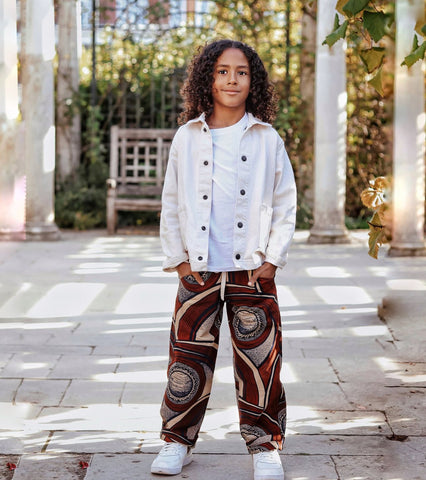
Asher modelling Kamso trousers
What nuggets of information would you tell your younger self when starting up Kamso?
I would say trust your gut. Continue to stay nimble because change is good and continue to reflect at all times. And finally stop being so hard on yourself. Your vision will be realised, but it takes time.
Who are you writing to this IWD?
I’m writing to Rebecca from the childrenswear brand Smaller Explorer. I love Rebecca, she started her business a little earlier than me and I have seen her grow from strength to strength. And the way she balances her family. I look at her with such admiration and I think she needs to be told that.
